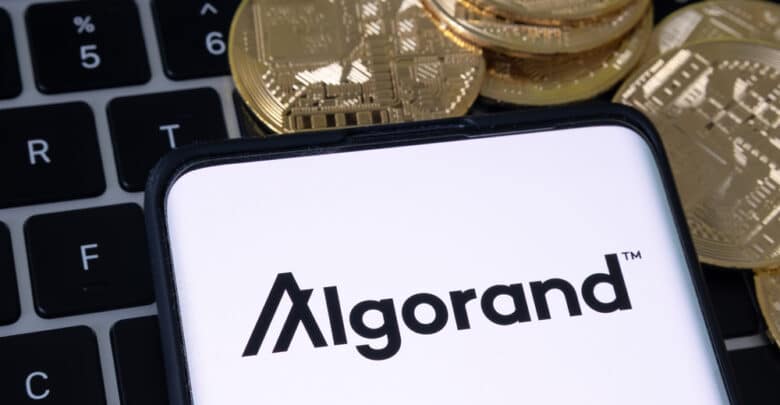Algorand’s blockchain innovation is driven by its native token, ALGO. With a fixed supply of 10 billion tokens, ALGO facilitates quick, cost-effective transactions. It’s used for staking, with rewarding APYs, and propels Algorand’s advancements in DeFi and NFT arenas.
The platform’s dual-tiered smart contract system allows for complex decentralized applications (dApps), while participation and relay nodes uphold network integrity. ALGO can be purchased on exchanges like Bybit and stored in wallets such as Pera for trading and staking purposes.
ALGO’s Supply and Distribution Dynamics
Algorand Inc., led by Turing Award laureate Silvio Micali, holds 2 billion ALGO, representing 20% of the initial distribution.
The Algorand Foundation manages the genesis 10 billion ALGO coins, steering the token’s distribution for ecosystem growth.
A significant share of ALGO supply is held by the community.
Reaching an all-time high of $2.37 in June 2021, ALGO has proven its market potential. By staking ALGO in wallets, holders not only secure the network but also earn rewards, enhancing the token’s appeal.
ALGO’s Multifaceted Utility and Use Cases
ALGO serves various roles within the Algorand ecosystem, from transaction fee payments to network participation rewards. Its utility spans across:
Issuing security tokens
Fungible token transactions
Smart contract execution
Governance participation
Staking ALGO thus becomes an investment in the future of finance, reinforcing the network’s security and yielding rewards for stakeholders.
Algorand’s Decentralized Promise
Algorand’s architecture is built to simultaneously achieve decentralization, scalability, and security. Its Pure Proof-of-Stake (PPoS) consensus mechanism ensures transaction finality and resilience against forks. Algorand’s high transaction throughput, capable of handling 1,000 transactions per second, underscores its technological prowess.
The PPoS Consensus Mechanism
Algorand’s PPoS mechanism stands out by:
Randomly selecting validators for equitable reward distribution.
Tackling the ‘rich get richer’ phenomenon prevalent in traditional PoS systems.
Ensuring a fair and inclusive network for all participants.
This consensus approach not only ensures rapid block generation but also fosters a highly efficient transaction environment.
Algorand’s Approach to the Blockchain Trilemma
While most blockchain platforms struggle to balance decentralization, security, and scalability, Algorand’s innovative consensus algorithm and network design allow it to achieve these goals simultaneously. This breakthrough has resonated positively within the crypto community, marking Algorand as a key player in the blockchain sector.
Algorand’s Network Structure
The Algorand network comprises participation nodes, crucial for transaction validation, and relay nodes, instrumental in maintaining ledger connections. The two-tier smart contract system facilitates both on-chain and off-chain applications, offering developers flexibility in crafting diverse dApps.
Participation Nodes and Relay Nodes
Participation nodes are pivotal in validating transactions and securing the Algorand network.
Relay nodes function as communication hubs, ensuring smooth network operation.
Though running a participation node does not currently yield rewards, it’s a vital contribution to network integrity and may offer potential benefits as Algorand evolves.
The Layered Smart Contract System
Algorand’s smart contract system is bifurcated into two layers:
Layer 1 handles simple transactions and asset creation.
Layer 2 is reserved for complex contracts and dApps.
This segregation allows Algorand to maintain efficiency and low fees, making it an ideal platform for DeFi and NFT projects.
Staking ALGO: Rewards and Network Contribution
Staking ALGO not only brings rewards to token holders but also bolsters the Algorand network’s security. With an estimated APY ranging from 6.12% to 14.05%, staking offers a lucrative opportunity for participants to earn passive income while contributing to the network’s robustness.
The Process and Benefits of Staking ALGO
To engage in staking ALGO, users typically:
- Choose a compatible wallet or exchange platform.
- Deposit ALGO tokens into their account.
- Opt into staking to start earning rewards based on the staked amount.
The minimal requirement for staking ALGO, usually as low as 1 ALGO, makes it accessible for a broad spectrum of users. This inclusivity reinforces the network’s decentralization and security. Rewards are distributed periodically, offering a continuous income stream for stakeholders.
Algorand’s Competitive Edge
Algorand’s unique features place it in direct competition with established blockchain platforms like Ethereum and Cardano. Unlike Ethereum, which faces challenges with network congestion and high fees, Algorand offers a more scalable and cost-effective solution. Compared to Cardano, which is still evolving its smart contract capabilities, Algorand’s advanced smart contract infrastructure and PPoS consensus provide a more immediate solution to the blockchain trilemma.
Conclusion
Algorand stands out as a revolutionary blockchain platform that effectively addresses the challenges of decentralization, scalability, and security. With its advanced technology, growing ecosystem, and strong focus on DeFi and NFTs, Algorand is not just a cryptocurrency but a comprehensive solution for the future of blockchain technology.
Whether you’re an investor, developer, or enthusiast, exploring Algorand and participating in its network through ALGO staking or trading can offer a front-row seat to the evolving landscape of blockchain and digital finance.








